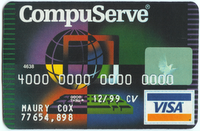
Originally published May 19, 1997
My first experience with the online world was back in the mid-1980s. A CompuServe disk came in the box with my first Apple computer, a IIc, and as geeky as the company’s name was, I couldn’t wait to try it out. The brochure promised a world of information, discussion groups and new friendships from the security of my own home.
Assembling the computer and turning it on, I put in the CompuServe disk and waited for the magic.
Nothing.
Can’t remember how I expected it to work, really — over power lines, maybe? This was before everyone and their grandmother knew about modems. I certainly didn’t, so it was back to the store for another high-tech, 2400 bps gadget.
When I finally connected, I was enraptured. My new computer sent me messages from the distant land of Columbus, Ohio, prompting me for information and assigning me a CompuServe member number — 76377,306 — which I proudly bear to this day. Although a 2400 bps modem seems slow in this day of 56.6 bps, ISDN and cable TV connections, it gave me time to savor every download of software, archived news stories or just typed messages back and forth between electronic pen-pals.
Over the years, any time I needed research materials for an article or book, I turned to CompuServe. It’s fast, reliable and offers an incomparable depth of source materials. We’ve also used it to order coffee, flowers and holiday gifts without fear of our credit card number being lifted — unlike doing business on the Web, where security is far less reliable.
CompuServe is also a wonderful way of making new friends:
- I remember reading the complaints of a would-be cartoonist in a comics forum. He grumbled about how no one gave his work a serious look. The next response in the string was from — I kid you not — Garry Trudeau, creator of “Doonesbury.” He told the message writer that he’d gladly have a look — and he did.
- My wife spends more time in the various CompuServe forums than I, which is where she made the electronic acquaintance of several writer/producers for the innovative HBO series “Dream On.” Being able to ask questions or comment on just-aired episodes was like being given a backstage pass.
- An exchange of forum messages with one “Dream On” writer led to another pen-pal. Bob Alper read Mrs. Media’s messages and wrote her, wondering if she was a scriptwriter. He explained that he was a Vermont-based rabbi-turned-standup comedian. Ironically, we had just returned from a vacation in Vermont where we read about a rabbi-turned-standup comedian. Sure enough, it was Alper, whom we’ve since dined with and seen perform several times.
- This column was first electronically distributed over CompuServe, being sent to many members of the service’s popular journalism forum. One of the first fan letters I received of any kind was from former Reagan speechwriter and CompuServe member Peggy Noonan. And when CompuServe temporarily blocked email delivery of this column to its members, I was overwhelmed by the supportive protests of some very well-known members of the media community.
The CompuServe of yesteryear was populated inside and out with pompous intellectuals and blinders-wearing techno-nerds, few of whom likely envisioned the plugged-in, tuned-in Internet free-for-all of the late 1990s. They spoke in jargon deliberately excluding less technical-minded folks, which no doubt explains, at least in part, why CompuServe is still struggling to grasp the way the world around it has changed while it stood still.
A decade ago, CompuServe was king of the online world, followed by GEnie and Delphi. America Online and Prodigy were barely blips on the radar. Today, of course, the situation is completely different. GEnie and Delphi are still around but skeletons of their past promise. Prodigy is, well, what the heck is Prodigy today? The Microsoft Network is making inroads but isn’t exactly setting phone lines ablaze.
Both America Online and CompuServe long resisted giving their private parties access to the World Wide Web for a long time, knowing the headaches it would bring. For too long, they insisted the benefits of their closed communities were great enough to thwart defections to the wide open and free resources of the Web.
Wrong!
When they finally realized that sticking their heads in the sand was not an effective business strategy, AOL plunged into the Web head first but banged its head on the diving board on the way down. CompuServe, on the other hand, moved toward the Web kicking and screaming, but avoided the bad press of its top competitor.
On the other hand, CompuServe’s myopia and slothishness toward the brave new world of Internet communications and commerce cost it dearly. Today, parent company H&R Block can’t give CompuServe away. Rumors of a possible merger with AOL drove down the latter’s stock and apparently stalemated talks.
In the last decade, I’ve gone through periods when I was more or less enamored of CompuServe for one reason or another. I tried America Online three or four times, ever frustrated by the inability to connect or receive help from customer support. But I always stuck by CompuServe. And now I’m worried about its future.
Rooting for CompuServe’s survival and renewal reminds me of my other favorite “lost” cause, Apple Computer. Both are based on proprietary technology and unique personalities that are not for everybody. Their futures, if they have futures, will not be in being all things to all peoples but in carefully attending to a particular niche of wildly supportive paying customers — like me.
 The Party Authority in New Jersey, Pennsylvania, Delaware and Maryland!
The Party Authority in New Jersey, Pennsylvania, Delaware and Maryland!

Leave a Reply